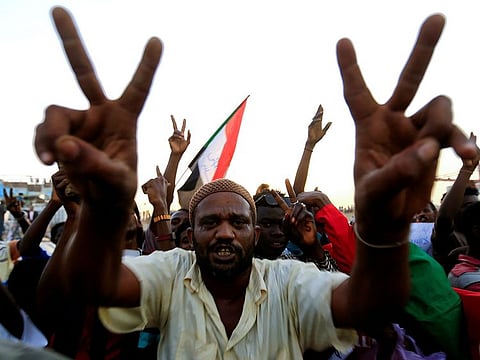Arab states support Sudan transition, want stability - UAE minister
Protesters block roads with stones and set fire to tyres late Tuesday

Dubai - Arab states support a transition in Sudan that balances the ambitions of the people with institutional stability, a senior United Arab Emirates minister said on Wednesday.
"Totally legitimate for Arab states to support an orderly & stable transition in Sudan. One that carefully calibrates popular aspirations with institutional stability," the UAE's Minister of State for Foreign Affairs, Anwar Gargash, said on Twitter "We have experienced all-out chaos in the region and, sensibly, don't need more of it," he added.
Military 'not serious'
Sudan’s main protest group said on Tuesday the military does not seem serious about transferring power to civilians after ousting President Omar Al Bashir, as both sides appeared to harden their positions.
Protesters and activists have been negotiating with the Transitional Military Council (TMC) to form a joint civilian-military body to oversee a transition, but are deadlocked over who would control the new council.
Opposition groups say it must be civilian-led and have promised to maintain a sit-in outside the Defence Ministry until their demands are met, but the TMC has shown no sign of willingness to relinquish ultimate authority.
In a sign of increasing tension, witnesses said protesters blocked roads with stones and set fire to tyres late on Tuesday in several areas of Khartoum North, across the Blue Nile from the centre of the capital - the first such protests since just after Al Bashir was toppled on April 11.
“What we feel from all the actions of the military council until now is that they are not serious about handing over power to civilians,” Mohammad Naji Al Assam, spokesman for the Sudanese Professionals Association (SPA), told reporters in Khartoum.
“With the passing of time the powers of the military council are expanded and this is a very big danger for the Sudanese revolution,” he said.
The SPA leads an alliance of activists and opposition groups called the Declaration of Freedom and Change Forces, which has held three meetings with the TMC since Saturday.
“The military council has the chance to participate in the state that we are working on ... but might lead us to the risk of straying into something unpleasant,” said Khalid Omar, one of the leaders of the Declaration of Freedom and Change Forces.
“We will continue the sit-in until the achievement of the goals of the revolution. Our demand is clear and that is civilian authority.”
Sudan's military rulers: No more 'chaos'
Sudan's ruling military council on Tuesday warned protesters against any further "chaos" as organizers called for mass rallies later this week.
Gen. Mohamed Hamdan Dagalo, the deputy head of the military council, said council members "are committed to negotiate, but no chaos after today."
He reiterated the military's demand that protesters clear roads and railways, saying seven provinces were running low on food, water and fuel.
The military overthrew long-ruling President Omar Al Bashir earlier this month amid four months of mass protests. The protesters have remained in the streets, demanding an immediate transfer of power to civilian rule and calling for mass rallies on Thursday.
Negotiations
The two sides are negotiating the formation of a new transitional government but are divided over the role of the military, which is dominated by Al Bashir appointees.
Dagalo said at least 12 security forces have been killed in clashes with protesters across the country since Al Bashir's April 11 ouster, without providing further details.
Negotiator Mohammed Al Asam, a senior member of the Sudanese Professionals Association, which spearheaded protests against Al Bashir, accused the military council of clinging to power.
"We feel that the military council is not serious in transfer power to civilians," he said.
Al-Asam said the protesters would submit their proposals for the sovereign council, the government and legislative body that would rule the country during a four-year transition.
The protesters at the main sit-in outside the military headquarters in Khartoum remained defiant, accusing the military leadership of trying to preserve al-Bashir's regime.
"Our message is clear: all these people won't go back for any reason," said Mohammed Adam, one of the protesters. "We are ready to die, because this is a message to the previous regime. We want to build a new country."
Another protester, Muhanad Ali Jumaa, said the sit-ins must continue if the revolution is to succeed.
"For a revolution, if you don't block the roads then we won't be putting pressure on these people," he said.






